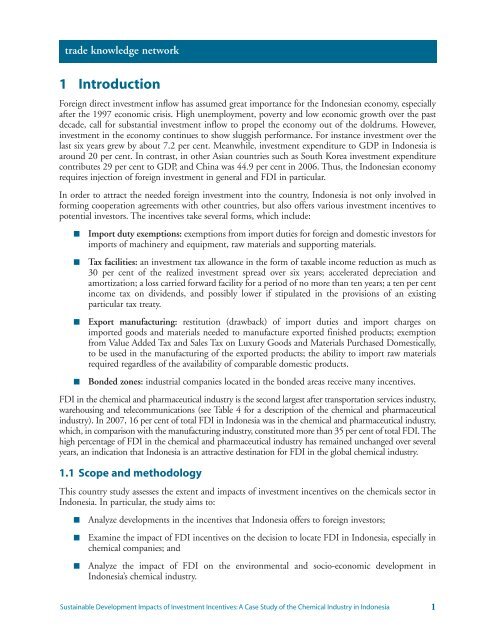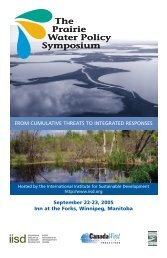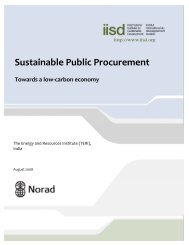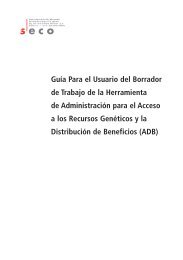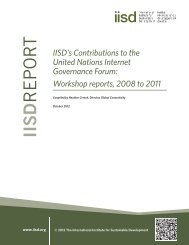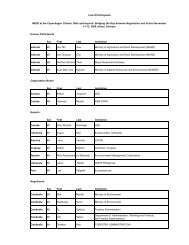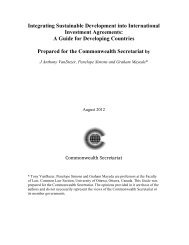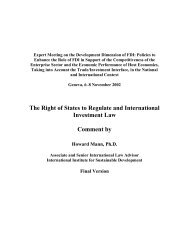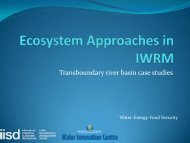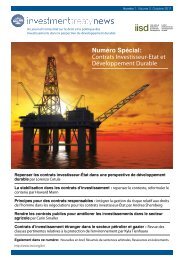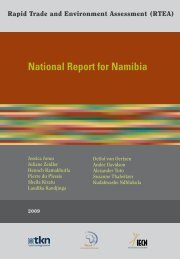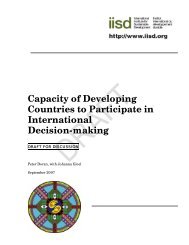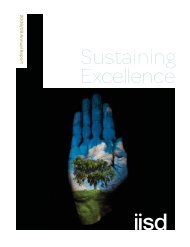Sustainable Development Impacts of Investment Incentives: A Case ...
Sustainable Development Impacts of Investment Incentives: A Case ...
Sustainable Development Impacts of Investment Incentives: A Case ...
You also want an ePaper? Increase the reach of your titles
YUMPU automatically turns print PDFs into web optimized ePapers that Google loves.
trade knowledge network<br />
1 Introduction<br />
Foreign direct investment inflow has assumed great importance for the Indonesian economy, especially<br />
after the 1997 economic crisis. High unemployment, poverty and low economic growth over the past<br />
decade, call for substantial investment inflow to propel the economy out <strong>of</strong> the doldrums. However,<br />
investment in the economy continues to show sluggish performance. For instance investment over the<br />
last six years grew by about 7.2 per cent. Meanwhile, investment expenditure to GDP in Indonesia is<br />
around 20 per cent. In contrast, in other Asian countries such as South Korea investment expenditure<br />
contributes 29 per cent to GDP, and China was 44.9 per cent in 2006. Thus, the Indonesian economy<br />
requires injection <strong>of</strong> foreign investment in general and FDI in particular.<br />
In order to attract the needed foreign investment into the country, Indonesia is not only involved in<br />
forming cooperation agreements with other countries, but also <strong>of</strong>fers various investment incentives to<br />
potential investors. The incentives take several forms, which include:<br />
■<br />
■<br />
■<br />
■<br />
Import duty exemptions: exemptions from import duties for foreign and domestic investors for<br />
imports <strong>of</strong> machinery and equipment, raw materials and supporting materials.<br />
Tax facilities: an investment tax allowance in the form <strong>of</strong> taxable income reduction as much as<br />
30 per cent <strong>of</strong> the realized investment spread over six years; accelerated depreciation and<br />
amortization; a loss carried forward facility for a period <strong>of</strong> no more than ten years; a ten per cent<br />
income tax on dividends, and possibly lower if stipulated in the provisions <strong>of</strong> an existing<br />
particular tax treaty.<br />
Export manufacturing: restitution (drawback) <strong>of</strong> import duties and import charges on<br />
imported goods and materials needed to manufacture exported finished products; exemption<br />
from Value Added Tax and Sales Tax on Luxury Goods and Materials Purchased Domestically,<br />
to be used in the manufacturing <strong>of</strong> the exported products; the ability to import raw materials<br />
required regardless <strong>of</strong> the availability <strong>of</strong> comparable domestic products.<br />
Bonded zones: industrial companies located in the bonded areas receive many incentives.<br />
FDI in the chemical and pharmaceutical industry is the second largest after transportation services industry,<br />
warehousing and telecommunications (see Table 4 for a description <strong>of</strong> the chemical and pharmaceutical<br />
industry). In 2007, 16 per cent <strong>of</strong> total FDI in Indonesia was in the chemical and pharmaceutical industry,<br />
which, in comparison with the manufacturing industry, constituted more than 35 per cent <strong>of</strong> total FDI. The<br />
high percentage <strong>of</strong> FDI in the chemical and pharmaceutical industry has remained unchanged over several<br />
years, an indication that Indonesia is an attractive destination for FDI in the global chemical industry.<br />
1.1 Scope and methodology<br />
This country study assesses the extent and impacts <strong>of</strong> investment incentives on the chemicals sector in<br />
Indonesia. In particular, the study aims to:<br />
■<br />
■<br />
■<br />
Analyze developments in the incentives that Indonesia <strong>of</strong>fers to foreign investors;<br />
Examine the impact <strong>of</strong> FDI incentives on the decision to locate FDI in Indonesia, especially in<br />
chemical companies; and<br />
Analyze the impact <strong>of</strong> FDI on the environmental and socio-economic development in<br />
Indonesia’s chemical industry.<br />
<strong>Sustainable</strong> <strong>Development</strong> <strong>Impacts</strong> <strong>of</strong> <strong>Investment</strong> <strong>Incentives</strong>: A <strong>Case</strong> Study <strong>of</strong> the Chemical Industry in Indonesia<br />
1


